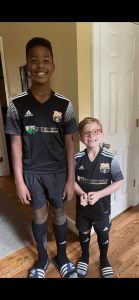 By now, you’ve had conversations with your significant other, your children, and probably your pediatrician about screen time. In case you don’t know what screen time is, it is the time spent in front of screens of some sort. That screen can be a television, a mobile device, a kindle. . . you get my drift. We even featured a blog on Screen Free Options recently. It honestly feels like we went straight from tummy time to quiet time to screen time. Maybe we didn’t really, but like everything else with growing children, the transition seemed to happen quickly.
By now, you’ve had conversations with your significant other, your children, and probably your pediatrician about screen time. In case you don’t know what screen time is, it is the time spent in front of screens of some sort. That screen can be a television, a mobile device, a kindle. . . you get my drift. We even featured a blog on Screen Free Options recently. It honestly feels like we went straight from tummy time to quiet time to screen time. Maybe we didn’t really, but like everything else with growing children, the transition seemed to happen quickly.
Screen Time
New Lingo of the Not-So-Littles
Sus
Sus is short for suspicious. This is seen mostly in the video game Among Us where there is usually an imposter. A player is labeled as “sus” if they’re suspected to be an imposter. Your children may use this word in normal conversation to describe the dinner you cook. “That broccoli is sus.” You can use it while describing the sudden cleanliness of their room. “Your closet and underneath your bed are sus,” you may say while pointing to the obvious places they have hidden things previously on the floor.
Sweats
Sweats usually used to describe opposing players in a video game (actual humans) who are playing the game extra hard. They play a lot and know the game really well. They also, perhaps, use too much force to win a round of the game without regard for others. “I can’t believe he won! He is such a sweat!” You can use this word when your child won’t pass the ball during his soccer game. “Stop being such a sweat and pass the ball!” (My children did not appreciate that one because I may have been talking about one of them)

O.P.
O.P. is short for overpowered. Someone or something is O.P. when they are awesome and most likely the absolute best. My 12-year-old likes to create his own characters in Madden 22. He makes himself with the highest percentage rating of passing, running, receiving, etc. He says to his brother, “did you see me (my character in this make-believe game) score that touchdown? I was O.P.” It’s football season. So if you want to be cool with your kids and impress your friends, you can say, “That Georgia defense is O.P.” (My husband offered that example, but he wanted to make sure you know he’s a Bama fan and that Nick Saban is O.P.)
Cap
Cap means “lie.” I’ve not heard this specifically in a video game but mostly by YouTubers or in music. The most common phrases are “stop the cap” or “that’s cap.” If you want to be hip and happening when your child tells you they finished their homework when you know they haven’t, you can say, “stop the cap.” Maybe you should only use it one time, though, because it could become a joke. We all know that lying about doing your homework is no joke. That’s no cap. (Translation: That’s no lie.)
Bruh
I’ve saved the best for last. Bruh is the 2020’s version of calling someone dude or man. When I was growing up (in the 80’s), I heard men refer to other men as “bruh,” and it was more like calling them “my brother.” Today, bruh can be used at any time, like while watching Spider-Man defeat Mysterio. My kid uttered a long drawn out “bruuuuuuh,” at this scene. His jaw dropped, then there was silence. It can also be used to refer to the dog. “Bruh, did you just poop in the house?” It is oftentimes used instead of mom or dad, as in, “Bruh, I brushed my teeth ten minutes ago.” To which I respond, “I am not your bruh. I am your mother.”
Honorable Mention: YEET! There is no definition for this word, in my opinion. It’s simply an annoying noise made just for one to be heard. My kids YEET one another from their bedrooms at night. It sounds like the smoke detector when the battery needs to be changed. If you know, you know.












